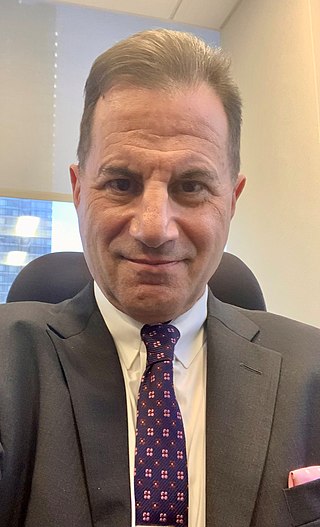Bankruptcy is a legal process through which people or other entities who cannot repay debts to creditors may seek relief from some or all of their debts. In most jurisdictions, bankruptcy is imposed by a court order, often initiated by the debtor.
Corporate titles or business titles are given to corporate officers to show what duties and responsibilities they have in the organization. Such titles are used by publicly and privately held for-profit corporations, cooperatives, non-profit organizations, educational institutions, partnerships, and sole proprietorships that also confer corporate titles.
Chapter 11 of the United States Bankruptcy Code permits reorganization under the bankruptcy laws of the United States. Such reorganization, known as Chapter 11 bankruptcy, is available to every business, whether organized as a corporation, partnership or sole proprietorship, and to individuals, although it is most prominently used by corporate entities. In contrast, Chapter 7 governs the process of a liquidation bankruptcy, though liquidation may also occur under Chapter 11; while Chapter 13 provides a reorganization process for the majority of private individuals.

Old HB, Inc., known as Hostess Brands from 2009 to 2013 and established in 1930 as Interstate Bakeries Corporation, was a wholesale baker and distributor of bakery products in the United States. Before its 2012 closure and liquidation, it owned the Hostess, Wonder Bread, Nature's Pride, Dolly Madison, Butternut Breads, and Drake's brands.
Debt restructuring is a process that allows a private or public company or a sovereign entity facing cash flow problems and financial distress to reduce and renegotiate its delinquent debts to improve or restore liquidity so that it can continue its operations.

In accounting, insolvency is the state of being unable to pay the debts, by a person or company (debtor), at maturity; those in a state of insolvency are said to be insolvent. There are two forms: cash-flow insolvency and balance-sheet insolvency.
Gregory D. Brenneman is an American businessman. He serves as the chairman of CCMP Capital, an American private equity firm.
The chief risk officer (CRO), chief risk management officer (CRMO), or chief risk and compliance officer (CRCO) of a firm or corporation is the executive accountable for enabling the efficient and effective governance of significant risks, and related opportunities, to a business and its various segments. Risks are commonly categorized as strategic, reputational, operational, financial, or compliance-related. CROs are accountable to the Executive Committee and The Board for enabling the business to balance risk and reward. In more complex organizations, they are generally responsible for coordinating the organization's Enterprise Risk Management (ERM) approach. The CRO is responsible for assessing and mitigating significant competitive, regulatory, and technological threats to a firm's capital and earnings. The CRO roles and responsibilities vary depending on the size of the organization and industry. The CRO works to ensure that the firm is compliant with government regulations, such as Sarbanes–Oxley, and reviews factors that could negatively affect investments. Typically, the CRO is responsible for the firm's risk management operations, including managing, identifying, evaluating, reporting and overseeing the firm's risks externally and internally to the organization and works diligently with senior management such as chief executive officer and chief financial officer.
A trustee in bankruptcy is an entity, often an individual, in charge of administering a bankruptcy estate.
Restructuring or Reframing is the corporate management term for the act of reorganizing the legal, ownership, operational, or other structures of a company for the purpose of making it more profitable, or better organized for its present needs. Other reasons for restructuring include a change of ownership or ownership structure, demerger, or a response to a crisis or major change in the business such as bankruptcy, repositioning, or buyout. Restructuring may also be described as corporate restructuring, debt restructuring and financial restructuring.
Robert Steven "Steve" Miller Jr. is an American businessman. He was chief executive officer of Hawker Beechcraft from 2012 to 2013, non-executive chairman at American International Group and on the board of directors at Symantec. He has served as Chairman of the Board of Purdue Pharma, Inc. since July 1, 2018.
Paul Michael Donovan is a British-born businessman and philanthropist, recognised for his abilities as a turnaround Chief Executive. He is the Chief Executive Officer of Arqiva Group Ltd since April 2020 and has been a non-executive Director at Thames Water Utilities Ltd since June 2019.
As a legal concept, administration is a procedure under the insolvency laws of a number of common law jurisdictions, similar to bankruptcy in the United States. It functions as a rescue mechanism for insolvent entities and allows them to carry on running their business. The process – in the United Kingdom colloquially called being "under administration" – is an alternative to liquidation or may be a precursor to it. Administration is commenced by an administration order.
Antonio Manuel Pérez is a businessman from Spain, former CEO of Eastman Kodak Company, based in Rochester, New York, in the United States.
Turnaround management is a process dedicated to corporate renewal. It uses analysis and planning to save troubled companies and return them to solvency, and to identify the reasons for failing performance in the market, and rectify them. Turnaround management involves management review, root failure causes analysis, and SWOT analysis to determine why the company is failing. Once analysis is completed, a long term strategic plan and restructuring plan are created. These plans may or may not involve a bankruptcy filing. Once approved, turnaround professionals begin to implement the plan, continually reviewing its progress and make changes to the plan as needed to ensure the company returns to solvency.

Peter S. Kaufman is an American investment banker and private equity investor. He is the President and Head of Restructuring and Distressed M&A at Gordian Group LLC, an investment banking firm. He is also a Managing Partner of Bacchus Capital Management, a winery investment concern.
AlixPartners is a financial advisory and global consulting firm best known for its work in the turnaround space. Jay Alix founded what became AlixPartners LLP in 1981. The firm has advised on some of the largest Chapter 11 reorganizations including General Motors Co., Kmart, and Enron Corp. The firm has since moved into a more traditional consulting space, and grown to a staff of over 1000. AlixPartners is headquartered in New York, and has offices in more than 20 cities around the world. They were also involved in the Bernie Madoff scandal, identifying 13,000 investors affected by the scandal for the prosecuting team.

Alvarez & Marsal Holdings, LLC(A&M) is a global professional services firm notable for its work in turnaround management and performance improvement of a number of large, high-profile businesses both in the US and abroad such as Lehman Brothers, HealthSouth, Tribune Company, Warnaco, Interstate Bakeries, Target, Darden Restaurants and Arthur Andersen.
Gregory F. Rayburn is an American businessman. He formerly served as Chairman and CEO of Hostess Brands.
Sanford C. Sigoloff was an American businessman and philanthropist. He became known as "Mr. Chapter 11" for his rescuing of a number of companies from bankruptcy, in the course of which he pioneered an investor-friendly "slash-and-burn strategy" at the expense of employees. He supported charitable causes and the UCLA Anderson School of Management, where is the namesake of an endowed chair.




